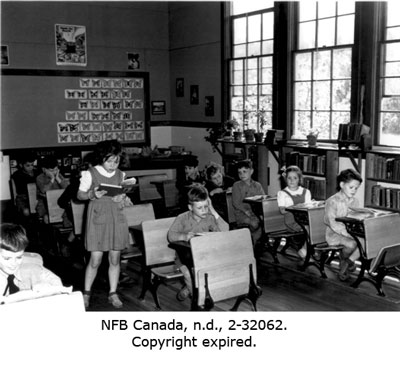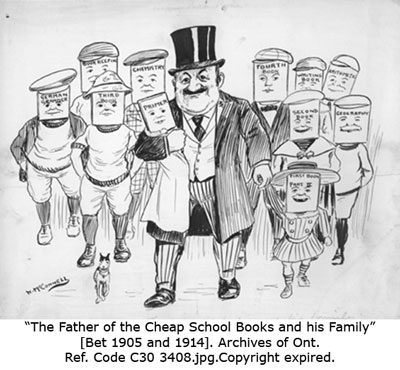Textbooks: More Than a Pedagogical Tool (Penney Clark)

At age nine, I discovered a small gray book, Learning to Speak and Write, in the loft of my mother’s childhood home, then a barn for storing hay. I was transfixed: it was familiar and yet unfamiliar. It was obviously a textbook, but its pages were so plain, so simple, so unadorned. The fanciful line drawing of a medieval knight in armour on its cover seemed incongruous both to the pages of mundane student exercises found within and to the lives of the prairie students who would have carried the book to school each day. I saw the names of uncles and aunts written inside the cover, and wondered why several members of one family used the same text; not realizing that, in the early decades of the 20th century in Canada, parents purchased textbooks and kept them in the family, rather than borrowing them from the school, as I did. It was profoundly intriguing. I still have that textbook on a shelf in my university office, an artefact of a bygone time, the spark that ignited my scholarly interest in textbooks.
My research explores the production and provision of elementary-high school textbooks in Canada (1846 to 2010). It examines the fundamental tension at the intersection of textbook as political instrument, economic commodity, cultural artefact, and pedagogical tool. It asks: How have three dominant stakeholders – departments of education, publishers, and booksellers – positioned themselves in conflicts over textbook production and provision (including provincial adoption policies)? Which publishing companies have controlled textbook production? What strategies have they used to maintain that control? How have notions of Canadian nationhood been reflected in the politics and economics of textbook publishing? Textbooks receive an official stamp of approval for classroom use by a government authority. They are used within the education system, but exist also within broader political and economic systems, and controversy related to their content, publishing, adoption, and distribution in Canada has existed since prior to the establishment of the first public school system in what is now the province of Ontario.
 This research began with pieces in The History of the Book in Canada, vols. 2/3 (U of T Press 2005/2007). They were followed by several historical case-studies. “‘Great Chorus of Protest’: The Booksellers’ Response to the 1909 Eaton’s Readers,” examines the controversy over the Ontario Education Department granting the tender to publish elementary school readers to the T. Eaton Co., a department store. This decision removed an important source of income from retail booksellers, who could not compete with the consumer appeal and economic clout of a department store, nor with its option of mail-order service. Over the decade beginning in 1909, booksellers fought vociferously in an effort to mitigate its effects on their profits. Their struggle was part of a larger effort by retailers to oppose mail-order provision of consumer goods in Canada. As a tax-supported bureaucracy, the Education Department held enormous economic power due to its control over the choice of textbook publisher and providers. By merging the roles of publisher and provider for elementary school readers, it wielded this power heedlessly, without thought to the implications of its decision within the broader political and economic contexts in which the books were printed and sold.
This research began with pieces in The History of the Book in Canada, vols. 2/3 (U of T Press 2005/2007). They were followed by several historical case-studies. “‘Great Chorus of Protest’: The Booksellers’ Response to the 1909 Eaton’s Readers,” examines the controversy over the Ontario Education Department granting the tender to publish elementary school readers to the T. Eaton Co., a department store. This decision removed an important source of income from retail booksellers, who could not compete with the consumer appeal and economic clout of a department store, nor with its option of mail-order service. Over the decade beginning in 1909, booksellers fought vociferously in an effort to mitigate its effects on their profits. Their struggle was part of a larger effort by retailers to oppose mail-order provision of consumer goods in Canada. As a tax-supported bureaucracy, the Education Department held enormous economic power due to its control over the choice of textbook publisher and providers. By merging the roles of publisher and provider for elementary school readers, it wielded this power heedlessly, without thought to the implications of its decision within the broader political and economic contexts in which the books were printed and sold.
“‘Gringo Operations’: Nationalism and Capital in Canadian Textbook Publishing, 1970-1981” (with doctoral student Wayne Knights) examines the impact of multinational firms in the context of post-war textbook publishing and English-Canadian identity. It explores events surrounding the crisis in educational publishing which occurred in the 1970s, ostensibly precipitated by the separate sales of Canada’s oldest publishers, Ryerson Press and Gage, to American firms. However, these events, and others, such as the near bankruptcy of McClelland & Stewart, were merely symptomatic. At the core were issues related to nationalism, politics, federal versus provincial autonomy, global capital, Canadian industry and Canadian culture, and Canada’s place as a neo-colonial nation.
(with doctoral student Wayne Knights) examines the impact of multinational firms in the context of post-war textbook publishing and English-Canadian identity. It explores events surrounding the crisis in educational publishing which occurred in the 1970s, ostensibly precipitated by the separate sales of Canada’s oldest publishers, Ryerson Press and Gage, to American firms. However, these events, and others, such as the near bankruptcy of McClelland & Stewart, were merely symptomatic. At the core were issues related to nationalism, politics, federal versus provincial autonomy, global capital, Canadian industry and Canadian culture, and Canada’s place as a neo-colonial nation.
My current project is an examination of regional textbook publishing through the lens of a case-study of the rise and decline of Douglas & McIntyre (Educational) in BC. This local firm, which was in place in various forms for a scant decade, was swallowed in 1989 by the much larger firm, Nelson Canada. The rich archival sources available for this study will be augmented by interviews with key players.

